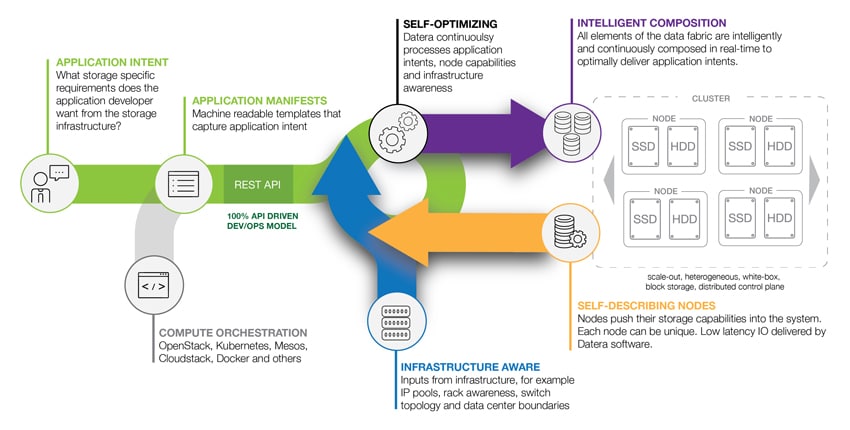
Today Datera announced the latest version of its Elastic Data Fabric platform with new enhancements. As we’ve preciously said, Datera Elastic Data Fabric is scale-out storage software that turns standard, commodity hardware into a RESTful API-driven, policy-based storage fabric for large-scale clouds. Datera states that their solution is the first storage solution for enterprise and service provider clouds that is designed with DevOps style operations in mind.
With version 2.0, Datera intends to bring even more advances in data storage. Companies will now be able to consolidate their application silos on one universal data infrastructure even when they are running a wide range of traditional enterprise applications or cloud-native workloads. This eliminating of silos can deliver a reduction of costs by up to 75%.
Datera is also expanding support for both for a wide variety of multi-generational industry standard servers (with HDD, SSD, and Hybrid) as well being VMware Ready for Storage certified with VAAI support and integrated with vCenter for provisioning and vRealize for cloud scaling. Along with this support Datera is also integrating with Mesosphere DC/OS. Datera states that this integration will enable seamless scalability and rapid self-provisioning for container-based cloud deployments for modern applications built on Cassandra, MongoDB and other NoSQL databases.
Datera Elastic Data Fabric 2.0 enhancements include:
- Support for all flash nodes, building on existing support for hybrid nodes
- Integration with Support for VMware’s VAAI, and integration with vSphere and vRealize suites
- Expanding dynamic cloud integration with support for CloudStack and CloudPlatform, along with existing OpenStack support
- Integration with Mesosphere DC/OSe, expanding existing Docker Swarm and Kubernetes container orchestrator integrations
- Improved scalability: up to 50 nodes with a total of five petabytes and five million IOPs per single cluster
- Rich Data Services: Data Compression and Data At Rest Encryption
- Multi-tenant storage management for enterprise applications, modern cloud architecture (DevOps, containers and microservices) and data clouds (for streaming analytics and big data applications)
- Expanding the hardware support to include Dell Poweredge R-Class servers, building on existing support with SuperMicro servers
- Expanded Business Models: Rack ready storage appliance, Perpetual SW License, or pay as you go OPEX model
Sign up for the StorageReview newsletter

